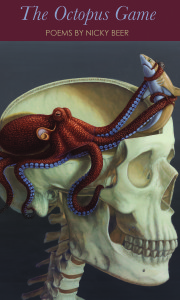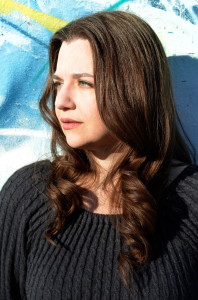 Book Title, Press, Year of Publication:
Book Title, Press, Year of Publication:
The Octopus Game, Carnegie Mellon University Press, 2015
Synopsis: Mostly poems about octopuses—really.
What do you think makes your book a “project book”?
The majority of the poems in the book are about cephalopods—mostly octopuses, but there’s a cuttlefish poem and a giant squid poem in there, too.
Why this subject (or constraint)?
The first poem of the book, “Octopus vulgaris,” is the first poem I wrote for the project, and I found that, even after I’d finished it, I still felt I had much more to say about the animal. Even after I’d decided to expand it to an eight-poem sequence, I wasn’t really thinking beyond that. But I had the good fortune, while drafting some of the earlier poems, to participate in a residency with Carl Phillips at the University of Missouri-Columbia, who thankfully said, “Why stop at eight poems?”
And of course, as a writer, I have an instinctual affection for anything that squirts ink when it’s provoked.
Are you comfortable with the term “project book”?
Absolutely. Although I’d prefer something more nefarious sounding, like “book-length hustle,” “literary long-con,” or “one-woman poetic conspiracy.”
Was your project defined before you started writing? To what degree did it develop organically as you added poems?
One of the great pleasures in developing this project came from one of its inherent challenges—how does one keep a whole pile of cephalopod-related poems from being too monotonous? I found myself looking at other books that I saw as project-driven in some way for advice—in Ted Hughes’ Crow the poems surround a single, if fractured, mythic subject, which I admired, but didn’t want to do for my book. Louise Glück’s The Wild Iris is a triumph of the poet representing the voices of humanity and God through different personae, and so I thought about how I could make persona work for my book. Learning about Fernando Pessoa’s heteronyms was a great discovery, too, in that it showed me how committed and immersed a poet can be in honoring his fragmented creative self. This may be one of the reasons why I’m not a fan of the term “finding one’s voice” as a writer—our goal should be to discover how many different voices inhabit us!
At the same time, I was learning about the astonishing capabilities of the octopus to change the shape, color, and texture of its body, both to pursue prey and elude predators. The physical malleability of the animal paired so beautifully with what I realized the project needed the most—i.e., a distinct sense of variation. So I came to the conclusion that I would try to find as many ways as possible to introduce variation into the book—through form, through persona, through tributes to other writers, through engagements with different film actors and visual artists, and even other languages.
I think it’s important to mention that these discoveries that allowed me to develop the project were essential to keeping things fun for me. Long-term creative projects, even ones that engage in serious, and even painful themes, still need to allow their creators to engage in play. Otherwise, what’s the point?
Did you allow yourself to break your own rules?
The rule-breaking, so to speak, came from me figuring out how the non-cephalopod poems could work in the book. These were poems that still spoke to ideas of the protean, camouflage, eros, and dread that inform the book as a whole, and I really enjoyed seeing the echoes of the cephalopod poems resound in them. For example, a poem like “Scene 43, Take: Interior, Sushi Restaurant,” in which an actor eats a whole live octopus onscreen definitely speaks to the octopusless (I think I just made that word up) poem “Nature Film, Directed by Martin Scorsese,” in that they both address these extraordinary moments of visible interiority that the film medium affords its audiences. And even in these other poems I found myself “hiding” a cephalopod here and there, as if in an old painting where infrared reflectography reveals painted-over figures from earlier stages in the work. “Marlene Dietrich Reads Rilke on the Lido, 1937” takes place on a beach in Venice, which means that there are definitely some cuttlefish skulking around in the background waves, even if they’re not verbally visible.
After completing a project, how did you transition into writing something new? What are you working on now? Another project?
This is something I’m definitely wrestling with as I write poems for the third book—I found myself initially putting way too much pressure on myself to detach entirely from the octopus-mode poems, but missing them profoundly at the same time—and the amount of octopus-related memorabilia that now swarms my office makes their images damn nigh inescapable. But I’ve slowly realized that the poems I’m writing still engage with some of the ideas that dominate The Octopus Game—illusion and subterfuge, specifically—but they’re slowly spinning off in their own directions: duplicitous taxidermy, plagiarism, stereoscopy, etc. I don’t know if the book will be as explicitly a “project” as The Octopus Game is—the working title is Real Phonies and Genuine Fakes, although that, too, could prove to be a counterfeit.
What advice can you offer other writers, particularly emerging writers or poetry students who may be using the project book as a guiding principle for their own work?
- Think about the project book in the same way that one needs to think about working in a restrictive poetic form, like a sonnet or a pantoum: let the constraint channel the direction and force of your energies, like a garden hose channels water.
- At the same time, look for ways to improvise within your project—like attaching a Water Wiggle to the end of the aforementioned hose.
- One must take poetry seriously, but we, as poets, should never take ourselves too seriously. To this end, always seek out ways to invite play into your projects, and even self-deprecation. There was a certain point when writing The Octopus Game when I knew that I needed to allow the octopus to make fun of me a bit for engaging in such a ludicrous undertaking. This became the poem “Ad Hominem,” which starts off with a parody of myself speaking, before the octopus takes over and gives me a going-over.
- Don’t assume that a “project” has to immediately be a discrete “project book.” My late friend and colleague, Jake Adam York, conceived of his poetic project of memorializing the martyrs of the Civil Rights movement as something that spanned several books, and the literary universe is all the richer for it.
- Be prepared to fail, and accept that every failure brings your project into sharper focus.


